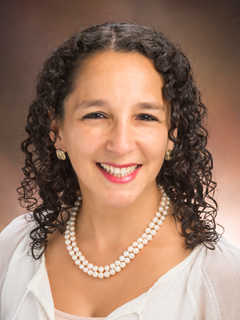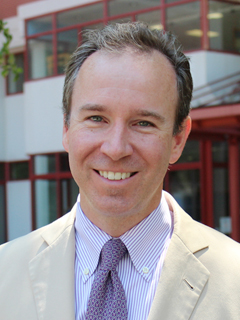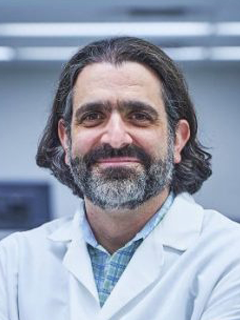HOW CAN WE HELP YOU? Call 1-800-TRY-CHOP
In This Section
Big Data Analysis, High-risk Neuroblastoma, D3b Supports Tumor Sample Milestone

In this week's news roundup, Arcus enables Children's Hospital of Philadelphia researchers to analyze more than 53 million data points, results of a Phase 1 study support safety and efficacy of a drug for children with high-risk neuroblastoma, and the Center for Data Driven Discovery in Biomedicine supports a rare tumor sample milestone.
Arcus Enables Researchers to Use Novel Technique for Clinical Data Analysis
Epilepsy Neurogenetics Initiative (ENGIN) researchers teamed up with the Department of Biomedical Health Informatics (DBHi) at CHOP and Drexel University's College of Computing & Informatics to analyze one of the largest cohorts of clinical data to date and map possible disease trajectories based on medical histories. Researchers utilized Arcus, a platform of tools and services accessible to CHOP's research community that links biological, clinical, research, and environmental data.
Scientists used the Human Phenotype Ontology (HPO), which provides a dictionary for more than 15,000 clinical terms, to standardize the information recorded and shared in Arcus. They then applied these terms across 53,955,360 electronic patient notes in the Arcus repository from more than 1.5 million people, using machine learning to classify medical conditions and predict future disease risk. The algorithm identified 9,477 distinct phenotypes that researchers then formatted into arrays for efficient representation based on HPO.
"The algorithm we developed in this study has the potential to be utilized in finding similarities between clinical trajectories and identifying novel genetic causes of diseases," said Ingo Helbig, MD, a pediatric neurologist in CHOP's ENGIN program and scientific director of the Arcus Omics program. "This will allow us to use machine learning in tandem with existing methods to analyze risks and patient prognoses in a more efficient manner at large scale."
Read more in this CHOP press release, and find the study published in Artificial Intelligence in Medicine.
First-in-Child Trial Supports Safety, Efficacy of Lorlatinib for High-risk Neuroblastoma
Yael Mossé, MD, professor of Pediatrics in the Center for Childhood Cancer Research at CHOP, along with a team of international researchers from Winship Cancer Institute of Emory University and the New Approaches to Neuroblastoma Therapy (NANT) Consortium, published a preclinical Phase 1 study that shows targeted therapy lorlatinib is safe and effective in children with relapsed/refractory anaplastic lymphoma kinase (ALK) driven neuroblastoma when given alone or in conjunction with chemotherapy.
Based on the study results, lorlatinib has moved upfront in a pivotal Children's Oncology Group phase 3 trial for newly diagnosed ALK-driven high-risk neuroblastoma. Neuroblastoma is an aggressive pediatric cancer that develops from early nerve cells, often appearing as solid tumor in the chest or abdomen. It contributes to up to 10% of childhood cancer deaths and is characterized by a variety of types and subtypes from interacting gene mutations.
Dr. Mossé's research focuses on how mutations in the ALK gene can lead to different types of nonhereditary cancer and which inhibitors can best fight it. A phase 1/2 Children's Oncology Group (COG) clinical trial in 2009 used the results of Dr. Mossé's research to incorporate crizotinib, an ALK inhibitor that was already approved by the U.S. Food and Drug Administration, to treat adults with a subtype of lung cancer caused by abnormalities in the ALK gene.However, only 15% of children with neuroblastoma responded to the treatment, suggesting a need for a more potent therapy.
Preclinical tests indicated that lorlatinib surpassed the effectiveness of crizotinib, which led to the Phase 1 first-in-child NANT trial published in Nature Medicine that showed approximately 30% of patients under 18 responded to the drug, and 67% of patients over 18 responded.
"This serves as a paramount example across all pediatric cancers of forward and reverse translation, where we learn from the science and from our patients and make decisions in real-time to fast-track development of new agents when there is potential for substantive impact," Dr. Mossé said.
Learn more about Dr. Mossé's work in this CHOP press release.
D3b Supports to Rare Tumor Sample Milestone in CORSICA Project
With the support of CHOP's Center for Data Driven Discovery in Biomedicine (D3b), the Cole-Reagins Registry for Sinonasal Cancer (CORSICA) project surpassed 100 patients with tumor samples and 450 samples with clinical data, an impressive milestone given that that opportunities for biospecimen collection are rare — sinonasal cancers affect 0.5-1 in every 100,000 patients. CORSICA is a wide-reaching research effort linking biospecimens from sinus cancers to a clinical registry to assess long-term outcomes across 10 study sites nationwide. D3b has become an integral part of this growing database by supporting biobanking efforts and specimen collection.
CORSICA began at Stanford University, led by Peter Hwang, MD, professor of Otolaryngology, whose team gathered data related to treatment, survival rates, and quality of life of patients with sinonasal cancer across five study sites. At CHOP, Phillip "Jay" Storm, MD, chief of the Division of Neurosurgery, and Adam Resnick, PhD, co-directors of D3b, saw an opportunity to strengthen CORSICA's specimen collection through the tools and resources available through the CHOP-led Children's Brain Tumor Network.
D3b now acts as the biospecimen repository and genomic data management center for the ongoing project. Participating studies send samples to be processed and stored in CHOP's Biorepository Core, which has the capacity for two to three million samples. The D3b team provides communication, training, and support to ensure the project's success, from protecting patient privacy to helping to mitigate financial burdens associated with specimen collection.
"It's incredibly exciting to see the advancement of treating sinonasal cancer after many years of hard work to get to this point of sequencing these rare, precious samples," said Kaitlyn Lehmann, clinical research program manager of D3b, in a blog post. "It would not be possible without the collaboration of our institutions and the dedication of a fantastic coordinating team."
Read more about the CORSICA project on the D3b website.
ICYMI
Catch up on our headlines from our March 31 In the News:
- CHOP Leaders Celebrate 100 Years of Research inThePhiladelphia Inquirer
- CHOP-led Study Finds Positive Parent-Adolescent Relationships Associated With Better Long-term Health
- Researchers Develop Newborn Seizure Prediction Model for More Personalized NICU Care
- Audrey Odom John Receives Prestigious Society for Pediatric Research Award
Keep up with our news, stories, and updates in real time by following us on Facebook, Twitter,LinkedIn, orInstagram. Meet the minds behind the science in the Bench to Bedside podcast. Or subscribe to our newsletter to get an email sent every other Friday bysigning up here.






